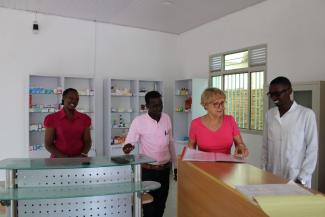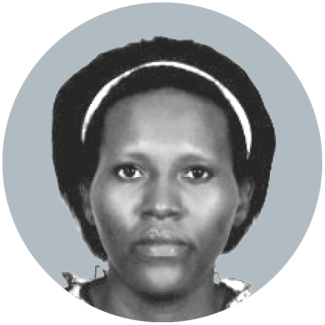Colonial past
German heritage in Burundi

When the Europeans divided Africa amongst themselves at the Berlin Conference in 1884, the territory of present-day Burundi was allocated to Germany. The first German missionaries and soldiers arrived in this part of German East Africa in 1896, but the construction of facilities such as schools and hospitals did not begin until 1909. Only seven years later, Belgian troops occupied the protectorate and put an end to the brief period of German rule.
The main historical site linked with the German colonial period is Kiganda in the central province of Muramvya. Kiganda was the capital of the then Kingdom of Burundi. The ruler, King Mwezi Gisabo, initially resisted the German occupation. But his forces were armed with bows and arrows, which were no match for the firepower of the German troops. So the king eventually submitted to the colonisers in 1903, signing the “Treaty of Kiganda”. Burundi did not regain its independence until 1962.
Among other things, the Germans abolished the traditional barter system and introduced rupees and heller. In the national language Kirundi, the word for coin is “amahera”, which is derived from the German “Heller”. Similarly, the word “ishule” can be traced back to the German “Schule” (school) and “intofanyi” – a more pronounced modification – to “Kartoffel” (potato), a crop plant that the Germans brought to Burundi.
But German heritage is not only reflected in the language. It is also recalled by places like the German Cemetery in Rugombo in the north-western province of Cibitoke. It contains the graves of ten German and other soldiers who fought in the First World War. The German embassy and Germans living in Burundi hold regular services of remembrance there.
There are also the “German Craters” in Rutana, a province bordering on Tanzania. The spectacular gorge landscape was a battleground during the First World War, where German troops fought against other invaders. Today, the mountains are used as a training ground by the Burundian army.
German-Burundian connection
The connection between Germany and Burundi was strengthened in 2017 when German was added to the curriculum of the University of Burundi. Around 20 students are enrolled on the programme. German teacher Helmenegilde Ntabiriho sees many advantages to learning the language, including the opportunity to gain scholarships. In addition, he points out that many works of world literature are written in German and it is an important language in science.
Lucien Nahimana, a Burundian who has lived for many years in Germany, says: “It’s a very important language to know and it’s easy to learn.” Renaud Niyonkeza is an actor and has toured Europe with his company. He too believes that German is an important language. “I learned some basic words and that helped me a lot,” he says.
Germany supports Burundi through bilateral and European cooperation. Organisations operating in Burundi include GIZ (Gesellschaft für Internationale Zusammenarbeit), the Federal Institute for Geosciences and Natural Resources, the Christian peace organisation Eirene and Welthungerhilfe. Areas in which they are active include water and sanitation, community development, media and conflict prevention.
In 2015, when then President Pierre Nkurunziza’s attempt to seek a further term in office triggered popular opposition on the streets, cooperation reached a low point. At present, Germany and the EU are engaged in a political dialogue with Burundi’s Ministry of Foreign Affairs, which is responsible for international development cooperation. At the heart of the dialogue is the Cotonou Agreement, which makes democratic principles – especially respect for human rights – the basis for cooperation.
Mireille Kanyange is a journalist and reporter for Radio Isanganiro in Burundi.
mika.kanyange@gmail.com








